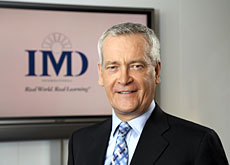Balancing act for new business school head

The incoming president of Lausanne's renowned IMD business school says the ability to keep innovating and to attract top-rate staff will be key to its future success.
John Wells, who takes up the post in the spring of next year, tells swissinfo that he also sees the International Institute for Management Development strengthening its global presence while being mindful not to overreach itself.
British-born Wells, currently professor of management practice at Harvard Business School, is succeeding Peter Lorange who is retiring after 15 years in charge.
swissinfo: You are leaving Harvard Business School to join one of its major rivals. What persuaded you to come to Lausanne?
John Wells: In essence it provides me with the opportunity to do everything I love. I really enjoy being in academia, doing research, teaching and working with colleagues on ideas. I also love running businesses, building them and shaping them. So the position of president at IMD offers me the opportunity of doing both at the same time.
swissinfo: The IMD’s MBA programme was ranked number one in the world this year by the Financial Times. What do you think it will take to retain this top ranking?
J.W.: What impresses me about the MBA programme at IMD is just how innovative it is compared with some of the other MBA programmes out there. As long as IMD continues to innovate and drive in the direction of a highly relevant programme that delivers participants who are even more valuable to the companies that hire them, I think it will continue to do well.
swissinfo: You say that demand for the IMD’s services outstrips supply and that the institution will have to make some clear choices in the future. What do you see as the priorities?
J.W.: A key challenge is that over the next five to ten years a number of the senior faculty are going to be retiring from IMD. It’s a common problem in many top business schools – IMD is no exception.
Then there are the sorts of issues that IMD is addressing: globalisation, execution, leadership
etc. These are very, very important to companies and there’s an enormous amount of demand for IMD services. I like the mix of what IMD provides, I just think that to make sure that we don’t oversupply, that we continue to deliver a high quality and do not overstrain the faculty, we need to be very careful about what we take on and what we don’t take on so that we don’t stretch people too far.
swissinfo: The IMD has established a China research centre in Shanghai and a similar research centre is planned for Mumbai, India. Does this reflect a strategy to take the IMD brand globally?
J.W.: The IMD brand is increasingly global, but the emphasis in the past has been on bringing people into Lausanne as a global meeting place. Over time large global clients are increasingly asking for in-country delivery of their content. So I would see that there are clear benefits in having capability in different parts of the world.
swissinfo: Swiss Economics Minister Doris Leuthard recently called for more women in senior positions in top companies. You have only four women among your 60-strong faculty. Do you intend to change this?
J.W.: I would like to see the profile of the faculty match increasingly the profile of the global community we serve. So it goes beyond women: it’s faculty from multiple countries around the world. I don’t think we have a large number of African faculty, for instance, so it’s a broader question.
swissinfo: The unions have been getting increasingly angry in Switzerland about the high salaries paid to senior managers. As a former senior executive, where do you stand on the idea of capping?
J.W.: I welcome shareholders taking a much stronger interest in how senior executives are compensated, because ultimately they must decide how senior executives are being paid. Certainly some salaries have gone through the roof and shareholders have not been active enough in putting pressure on to make sure they are getting value for money.
swissinfo: You say you see Switzerland as multicultural and a place that fosters an open atmosphere for debate. Were you surprised by the virulence of some of the campaigning in the run-up to October’s general elections?
J.W.: I saw some posters which I would say were disappointing, because they didn’t reflect the normal Swiss way of doing things. On the other hand, would one want to suppress that sort of thing? No, that’s all part of free speech. But I think it’s unfortunate.
What I like about Switzerland is that one can run a conference here and when people arrive from every part of the world they are welcome. Therefore one can have a balanced discussion of the issues with senior people from around the world. That is a wonderful quality of Switzerland.
swissinfo-interview: Adam Beaumont
John Wells co-founded management consulting firm Monitor Company in 1986 and led its European operation until 1993.
He held senior executive roles at PepsiCo and Thompson Travel prior to joining Harvard Business School in 2002.
IMD is one of the world’s leading graduate business schools.
It was established in 1990 from the merger of two previously independent business schools: IMI, founded in Geneva by Alcan in 1946, and IMEDE, founded in Lausanne in 1957 by Nestlé.
Every year around 8,000 executives, representing more than 98 nationalities, attend more than 20 open-enrolment Executive Development Programs (including intensive MBA and EMBA programmes).
The IMD MBA class is made up of 90 participants from more than 35 nationalities. The programme lasts 11 months
The Financial Times (2007) ranked IMD’s executive education programmes 1st outside the USA and 3rd worldwide.
IMD’s MBA was ranked 1st worldwide in the 2007 FT “Ranking of Rankings”, the combined global annual MBA rankings from Business Week, The Economist, Financial Times, Forbes and the Wall Street Journal.

In compliance with the JTI standards
More: SWI swissinfo.ch certified by the Journalism Trust Initiative


You can find an overview of ongoing debates with our journalists here. Please join us!
If you want to start a conversation about a topic raised in this article or want to report factual errors, email us at english@swissinfo.ch.